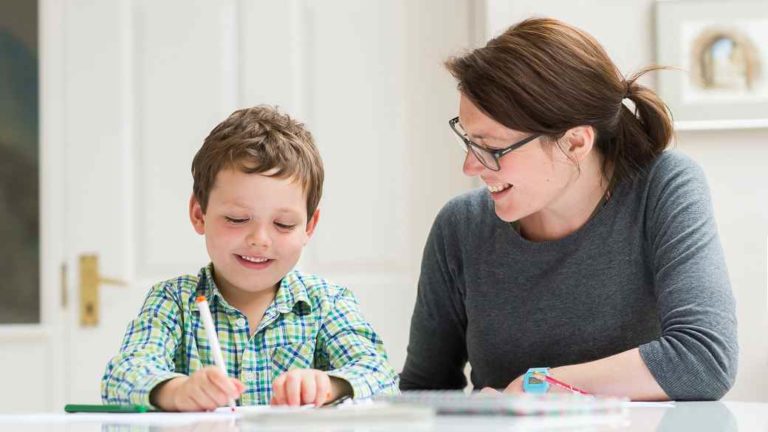Homeschooling: How to keep your child learning during school closures
In this blog, Michael sets out strategies and resources to make home learning a successful experience for your child. The advice given here can be combined with online tuition to keep your child engaged and in good spirits while schools are closed.
Like many parents, you may be worried about the impact school closures will have on your child. Perhaps your son or daughter was expecting to take examinations this summer but has suddenly found themselves at a loose end with their exams cancelled. Perhaps you are concerned about the government’s new calculated grade system and feel that your child should still be keeping up with their key subjects. Perhaps you are just looking ahead to the likelihood that schools will not return until the autumn, thinking that you don’t want your child to fall behind in their learning.
Here is some advice, from a teacher, on how you can make home learning a successful experience:
Set up a routine
Children are used to learning routines. From the moment they arrive in school, their learning is shaped by habitual expectations. If you can transfer some of these practices to the home, you can create a routine that is already familiar to your child.
Here are some strategies to set up a home learning routine:
- Establish a learning environment: This place should be quiet and comfortable where your child can be easily supervised. Preferably a space that is away from their bedroom and free from distractions, such as the internet. If your child only uses this environment to work in, their brain will naturally associate being there with doing their schoolwork.
- Draw up a timetable they recognise: If your child is used to having English as their first lesson on a Monday morning, then transfer this into their home learning schedule. Lessons and break times can follow the routine they did at school, and subjects can be rotated in a similar way. They may grumble but it is, after all, a structure they are used to.
- Be consistent: Establish routines at the beginning and end of sessions. Start with a settling activity where you talk through what your child will achieve and how they will do it. Then, end the session with a reflective conversation where you ask your child what went well and what could be improved upon. You might also integrate their study into other household routines. For example, walking the dog together for twenty minutes between Maths and English revision can improve your child’s concentration levels.
- Set expectations: Some children aren’t used to working on their own and like to be directed. If their school is still setting work for them, set an expectation for the number of tasks to be completed in each study session. You can also set expectations based on progress. For example, your child might redraft a piece of creative writing using a thesaurus to improve their vocabulary.
Keep them stimulated
Hopefully your child is receiving materials from their school to keep them occupied. In case this isn’t happening, or if you feel that your child needs extra support in some areas, there are plenty of educational resources available online.
Here are some recommended resources for home learning:
Home Learning Packs
Home Learning Packs in a range of subjects are already available through the TES resource section. These packs have all been specifically designed by teachers and are therefore set up for children to work through independently.
https://www.tes.com/resources/search/?q=home%20learning%20pack
Reading Lists
The School Reading List is curated and reviewed by a small group of librarians, English teachers and parents who meet and discuss books that have worked well with different groups of children. You can find recommended books for all age groups, alongside fun competitions and exam resources. If you can, read the book your child chooses so that you can discuss it together.
https://schoolreadinglist.co.uk/
Exam Resources
For parents who want study activities that are focused on exam preparation, BBC bitesize is an excellent resource. Here you can find tasks and activities for different exam specifications alongside blogs and articles to support home learning.
https://www.bbc.co.uk/bitesize
News and Entertainment
Sometimes it is nice to have light-hearted activities for the whole family to participate in. First News is an award-winning national newspaper for UK children that aims to get students talking about topical issues in easy to understand and non-threatening ways. It also includes lots of fun activities such as entertainment, games, sports and puzzles.
Talk to them about it
Learning is better shared. In fact, research shows that collaborative and active learning are some of the most successful forms of study. So, if you can, make home learning a part of family life. You don’t need to be an expert to take an interest and ask questions about the concept your child is studying.
Here are a few tips to help you engage with your child’s home learning:
- Make use of the time when everyone’s together: Mealtimes can be especially good for this. Even a small habit, such as choosing an article in the morning that everyone will read by dinnertime, can provoke an interesting discussion. This kind of routine would also work well with set texts or units from revision guides.
- Be the student: Aristotle said, ‘Teaching is the highest form of understanding.’ Therefore, if your child can successfully explain the message of a poem or talk you through a scientific process, you can be sure that they truly understand that concept.
- Ask questions: In classroom environments, teachers use questions in a structured way to check student understanding and challenge their thinking. This is sometimes referred to as Blooms Taxonomy. The following article gives a brief explanation and examples of the types of questions that teachers ask. Essentially, start at the knowledge level and work your way up to evaluation. Or set some of the harder questions as written tasks. Either way, this article gives you an idea of the questions you might ask your child to challenge their thinking.
https://www.thoughtco.com/blooms-taxonomy-questions-7598
Hopefully, these strategies and resources can help you navigate your child’s home learning. If you combine this approach with some targeted tuition, then you can rest assured that your child is continuing to make good progress even when they’re not in school.



Start the discussion!